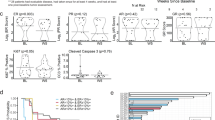Abstract
Purpose Patients with visceral metastases (VM: lung and/or liver metastases) are generally regarded as being less responsive to hormonal therapy, and chemotherapy often becomes the default treatment. This paper reports a subgroup analysis from EFECT (The Evaluation of Faslodex versus Exemestane Clinical Trial) examining the efficacy of fulvestrant and exemestane in patients with or without VM. Methods EFECT is a randomised, double-blind, multicentre, Phase III trial in postmenopausal women with advanced breast cancer progressing or recurring after prior non-steroidal aromatase inhibitor therapy. Results Overall, approximately 57% of patients in EFECT had visceral involvement. Fulvestrant and exemestane demonstrated clinical benefit in 29.1% and 27.2% of patients with VM, respectively. Median duration of response was 13.5 vs 10.8 months and median duration of clinical benefit was 9.9 vs 8.1 months, respectively. Conclusions These results encourage the use of endocrine agents such as fulvestrant in treating patients with advanced breast cancer and VM.



Similar content being viewed by others
References
Solomayer EF, Diel IJ, Meyberg GC, Gollan C, Bastert G (2000) Metastatic breast cancer: clinical course, prognosis and therapy related to the first site of metastasis. Breast Cancer Res Treat 59:271–278. doi:10.1023/A:1006308619659
National Cancer Institute PDQ Statement (2007) Breast cancer (PDQ): treatment. Stage IIIB, inoperable IIIC, IV, recurrent, and metastatic breast cancer. Available via http://www.nci.nih.gov/cancertopics/pdq/treatment/breast/HealthProfessional/page8. Accessed 8 May 2007
National Comprehensive Cancer Network (2007) NCCN Clinical practice guidelines in oncology, Version I: Breast cancer. Available via http://www.nccn.org. Accessed 30 Mar 2007
Kaufmann M, Bajetta E, Dirix LY et al (2000) Exemestane is superior to megestrol acetate after tamoxifen failure in postmenopausal women with advanced breast cancer: results of a phase III randomized double-blind trial. The Exemestane Study Group. J Clin Oncol 18:1399–1411
Howell A, Robertson JF, Vergote I (2003) A review of the efficacy of anastrozole in postmenopausal women with advanced breast cancer with visceral metastases. Breast Cancer Res Treat 82:215–222. doi:10.1023/B:BREA.0000004375.17920.0b
Mauriac L, Pippen JE, Quaresma Albano J, Gertler SZ, Osborne CK (2003) Fulvestrant (Faslodex) versus anastrozole for the second-line treatment of advanced breast cancer in subgroups of postmenopausal women with visceral and non-visceral metastases: combined results from two multicentre trials. Eur J Cancer 39:1228–1233. doi:10.1016/S0959-8049(03)00199-0
Ingle JN, Suman VJ, Rowland KM et al (2006) Fulvestrant in women with advanced breast cancer after progression on prior aromatase inhibitor therapy: North Central Cancer Treatment Group Trial N0032. J Clin Oncol 24:1052–1056. doi:10.1200/JCO.2005.04.1053
Perey L, Paridaens R, Hawle H et al (2007) Clinical benefit of fulvestrant in postmenopausal women with advanced breast cancer and primary or acquired resistance to aromatase inhibitors: final results of phase II Swiss Group for Clinical Cancer Research Trial (SAKK 21/00). Ann Oncol 18:64–69. doi:10.1093/annonc/mdl341
Gennatas C, Michalaki V, Carvounis E et al (2006) Third-line hormonal treatment with exemestane in postmenopausal patients with advanced breast cancer progressing on letrozole or anastrozole. A phase II trial conducted by the Hellenic Group of Oncology (HELGO). Tumori 92:13–17
Steele N, Zekri J, Coleman R et al (2006) Exemestane in metastatic breast cancer: effective therapy after third-generation non-steroidal aromatase inhibitor failure. Breast 15:430–436. doi:10.1016/j.breast.2005.08.032
Carlini P, Michelotti A, Ferreti G et al (2007) Clinical evaluation of the use of exemestane as further hormonal therapy after nonsteroidal aromatase inhibitors in postmenopausal metastatic breast cancer patients. Cancer Invest 25:102–105. doi:10.1080/07357900701224789
Chia S, Gradishar W, Mauriac L et al (2008) A double-blind, randomized, placebo-controlled trial of fulvestrant versus exemestane following prior non-steroidal aromatase inhibitor therapy in post-menopausal women with hormone receptor-positive advanced breast cancer: results from EFECT. J Clin Oncol 26:1664–1670. doi:10.1200/JCO.2007.13.5822
Therasse P, Arbuck SG, Eisenhauer EA et al (2000) New guidelines to evaluate the response to treatment in solid tumors. J Natl Cancer Inst 3:205–216. doi:10.1093/jnci/92.3.205
Steger GG, Gips M, Simon SD et al (2005) Fulvestrant (‘Faslodex’): clinical experience from the compassionate use programme. Cancer Treat Rev 31(Suppl 2):S10–S16. doi:10.1016/j.ctrv.2005.08.009
Neven P, Paridaens R, Pelgrims G et al (2008) Fulvestrant (‘Faslodex’) in advanced breast cancer: clinical experience from a Belgian cooperative study. Breast Cancer Res Treat 109:59–65. doi:10.1007/s10549-007-9628-2
Acknowledgements
Dr Mauriac has acted as a consultant for, and received honoraria from, AstraZeneca and Novartis. Dr Romieu has no potential conflicts of interest. Dr Bines has acted as a consultant for, and received honoraria from, AstraZeneca. This study was sponsored by AstraZeneca. The sponsors were involved in the study design, and collection, analysis and interpretation of data. The authors would like to thank Sandra Cuscό, PhD, from Complete Medical Communications, who provided medical writing support funded by AstraZeneca.
Author information
Authors and Affiliations
Corresponding author
Rights and permissions
About this article
Cite this article
Mauriac, L., Romieu, G. & Bines, J. Activity of fulvestrant versus exemestane in advanced breast cancer patients with or without visceral metastases: data from the EFECT trial. Breast Cancer Res Treat 117, 69–75 (2009). https://doi.org/10.1007/s10549-008-0141-z
Received:
Accepted:
Published:
Issue Date:
DOI: https://doi.org/10.1007/s10549-008-0141-z




